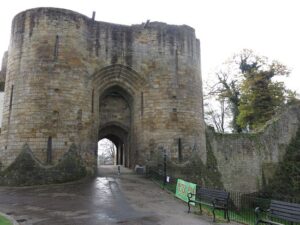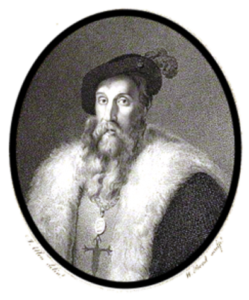Duke of Buckingham
Sir Humphrey Stafford, Duke of Buckingham
 Oh look another Stafford! Also another Humphrey Stafford, but this one is of a much higher social ranking.
Oh look another Stafford! Also another Humphrey Stafford, but this one is of a much higher social ranking.
Childhood
Born 1402 son of Edmund Stafford 5th Earl of Stafford and Anne of Gloucester, and through his mother he was of Royal descent. When his father died in battle in 1403 he became the 6th Earl of Stafford. Humphrey, now a became a ward of henry IV and Queen Joan.
Rising amongst the ranks
Humphrey joined Henry V in France in 1420 and was knighted in 1421. During the minority of Henry VI, he became known for his mediation and diplomacy skills between the factions vying to control the young king. He attended the kings coronation in France and was at the interrogation of Joan of Arc. This is not to say he didn’t have flaws, he also had a temper, he reputedly tried to stab Joan of Arc and had to be restrained at one point! Once the King’s minority ended, Humphrey continued to support the King.
Humphrey married Lady Anne Neville in 1424. They had up to 12 children of which some died very young.

When his mother died in 1438, Humphrey became the greatest landowners in England and a very wealthy man. He owned many estates and a regular visitor of his castle at Tonbridge. Sevenoaks (The Battle of Solefields) was under the jurisdiction of Tonbridge, was Jack Cade seeking support from Humphrey (very unlikely).
Captain of Calais
In 1441, Humphrey was made Captain of Calais. Humphrey had to pay for the garrison and improve the defences of Calais himself as funds coming in were sporadic at best. When he was replaced in 1451 Humphrey was owed in excess of £19,000 and was allowed to collect all the wool tax from the Port of Sandwich until the debt was paid. He was even allowed to name his own tax collector there.
In 1444, Humphrey was made Duke of Buckingham. Although he was on the committee that investigated the witchcraft accusation of the Duke of Gloucester’s wife (1442), and at the Dukes arrest (1447) for treason at Bury ST Edmunds, the rebels still named him as a true liege man, even though he profited from Gloucester’s downfall.

Arbitrator
Humphreys relationship with the Duke of Suffolk seems to be one of a working relationship. Humphrey seemed not to side with either side of the factions that were created but rather supported the King. When the Duke of Suffolk sent a message to Calais to see how he would be received it would not have been to Humphrey himself but rather one of his lieutenants. I can see no reason as to why the Duke of Suffolk would not have been received and then sent on his way to Burgundy.
During the rebellion, Humphrey was one of the chief negotiators. After the rebellion he was on the commission to hear grievances and pass judgement on the rebels. Humphrey continued to support the King as a councillor and was not punished during the first reign of Edward IV. He died in Northampton, supporting the Lancastrian cause.
Humphrey, even though I have portrayed him to be virtuous, he was not a saint. He was quick to anger and violence (especially in younger days), but it does not have any relevance in regards the Jack Cade rebellion or the causes of it, so hence there is little mention. Whenever the King had something important to do, Humphrey was never far away to support him. As an arbitrator, he did a very good job in not taking sides.
